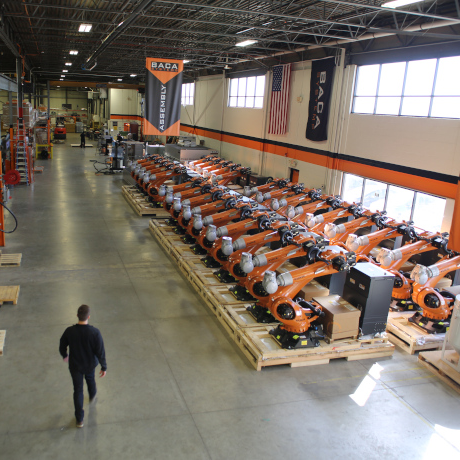The British Broadcasting Corporation (BBC) was established in 1922 and is the world’s oldest national public service broadcaster. With more than 20,000 employees based in the UK and global offices from London to Beijing to Los Angeles, it is also the world’s largest broadcaster by total employee count.
The production and maintenance of the BBC’s online service, including iPlayer, Sounds, News, Sport, Weather, Bitesize and Childrens is one of the responsibilities of the 3,000-person Design and Engineering (D+E) department, who rely on hundreds of internal applications to do their work.
The use of real-time collaboration tools has been a large part of the online teams’ culture for over 20 years, from a simple custom telnet-based tool in the early days, through to extensive use of IRC for the last decade. These tools were designed for use by technical staff at home with command line interfaces and x509 certificates, but were becoming a barrier to collaboration with less technical staff or anyone not using a desktop, making them increasingly inappropriate for multi-disciplinary product teams.
In addition, those tools didn’t integrate with other operationally-critical applications, like Jira and GitHub, integral to the team’s workflows. The proposal to adopt Slack came from the bottom up, as various teams within the organization began using it to make team communication and workflows more efficient. Recognizing the popularity and utility of Slack, D+E decided to formally roll out Slack so that teams working on digital products could more easily and quickly share information and collaborate on projects.
This was rolled out and supported by a small team that looks after the key set of tools used by digital teams, which includes Confluence, Jira, and GitHub among others. Slack channels and integrations improve collaboration within and across departments, for both development lifecycle and incident management.
Finding answers and resolving issues faster with Slack channels
The 2018 FIFA World Cup™ marked a particularly notable occasion for the BBC, not just because of the profile of the event and its massive viewership, but because, for the first time, they planned to trial stream matches online in Ultra High Definition (UHD).
Launching a brand new broadcasting stream in the midst of one of the world’s most popular sporting events requires a deeply collaborative effort. Both in advance of and during the games, swarms of engineers, designers, app developers, editorial and video streaming specialists needed to stay tightly connected to ensure that everything functioned properly and that streaming was going smoothly.
As can be expected with such a ground-breaking operation, the trial did not go without incident. Each time there was an issue, team members from across these various groups needed to come together to find answers and discuss fixes as quickly as possible.
This was coordinated through a Slack channel dedicated to the UHD trial from its inception, with the incidents managed through a shared #operationschannel following the BBC’s standard practice.
Compare this to the old days, communication with editorial teams, including the production team, based in Moscow, could all take place in a channel which would once have been the preserve of the technical teams only. That simplified communication in particular where the impact of an incident was to recommend an action to be taken by the production team.
The BBC’s use of Slack is complex, with large teams or departments having their own workspaces, and a common set of shared channels (like #operations and #change). Another highly effective set of channels used by D+E members are the “help” channels, like #help-locator. Locator is a web service that BBC Online uses to search for locations, and returns data about those locations. If someone has a question on the use of a service, they simply post a note in the dedicated help channel where the relevant team members are.
Hold the phone: BBC teams bridge communication gaps by inviting external partners into Slack
The BBC has a large number of partners and suppliers that are critical to the operation of its digital services. After all, the operations team aren’t only watching their own systems, they need to know what’s happening with their partner’s networks that could possibly affect their audience.
Communication with some of these organizations, in particular during major events, is facilitated by bringing them into Slack through multi-channel and single-channel guest accounts (allowing the BBC to have control over which Slack channels external partners have access to).
Now that all relevant team members can monitor charts and graphs in a single Slack channel, the operations team can spot potential issues ahead of time and discuss how to prevent them from happening altogether.
By making Slack channels part of so many people’s daily workflow, including core strategic partners, questions can easily be posed to the right teams and individuals, and useful information is stored in Slack for easy, consistent access.
Custom bots automate manual processes and get new employees on board quickly
In any large organization, getting up to speed on workplace processes takes time and patience. BBC’s custom-built bot @chas eases that transition by offering helpful automated advice for new employees in a friendly tone.
When new employees join Slack, @chas sends the new hire a welcoming direct message. The bot then sends information about how to use Slack and the purpose of certain channels. Even after the initial on-boarding is done, employees continue to receive helpful tips from @chas, including suggestions for how to navigate using Slack.
Beyond organizing the department’s digital knowledge, Slack also helps teams keep track of physical products. For example, the children’s television production team uses numerous different types of test devices that they also lend out to other departments. When children’s division producers and testers need to call those items back, they need a quick, simple process for locating a particular device.
All of that information used to be tracked in cumbersome spreadsheets. But thanks to Slack’s API, a few clever engineers wrote their own custom integration (called @Devicebot) that connects to a back-end database then surfaces relevant information about a device’s whereabouts right in Slack.
Anyone can talk directly to @Devicebot and say something like, ‘Where’s the iPad2?’ and the bot will search the database and return to Slack with a response like, “iPad2 is in doc House with the TV platforms team”. Saving everyone a lot of time, trouble, and running around.
Greater transparency, increased collaboration, and less guesswork makes for a highly efficient team
@Devicebot is a small example, but representative of a wider trend: increased transparency and access to information—both of which are crucial to keeping teams more connected and more productive. With Slack, D+E department members have to do less guesswork when it comes to finding out who to ask or where to go when issues arise.
A combination of Slack workspaces, channels, guest accounts, and integrations help a diverse design and engineering team work closely together on complex services. With a central collaboration hub that’s customizable to their team’s needs, they’re now able to resolve issues at a much faster rate than ever before. Meanwhile, viewers can continue enjoying their favorite televised events gloriously uninterrupted.















